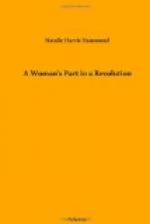Mr. Sammy Marx rose and left the room. I was seized with one of those sudden and unaccountable panics, and from sheer embarrassment—my mood was far too tragic to admit of flippancy—blurted out, ’You must come to America, Mr. President, as soon as all this trouble is settled, and see how we manage matters.’
Kruger’s face lighted up with interest. ‘I am too old to go so far.’
‘No man is older than his brain, Mr. President’; and Kruger, who knew that in all the trouble he had shown the mental vigour of a man in his prime, accepted my praise with a hearty laugh. This was joined in by the Boers from the other end of the room.
Mrs. Kruger refused to see me, and I liked her none the less for her honest prejudice. I stood to go. President Kruger rose, removed the pipe from between his teeth, and, coughing violently, gave me his hand.
Mr. Grobler escorted me to the gate. ’Mrs. Hammond, I shall be glad to serve you in any way possible to me,’ he said with courtesy.
’Then will you say to Mrs. Kruger that I am praying to the same God that peace may come?’
MONDAY, FEBRUARY 3.—The preliminary trial of the Reform Committee prisoners was called this morning. The hearing was in the second Raadzaal. Although the accommodation for the public was limited there was a large crowd of Johannesburgers present.
Shortly before ten o’clock an armed escort marched up to the jail for Messrs. Hammond, Phillips, Farrar, Fitz-Patrick, and Rhodes. The other Reformers stood in a bunch at the entrance of the hall. All the principal Government officials were present. Sir Jacobus de Wet appeared, accompanied by Mr. J. Rose Innes, Q.C., who had come from the Cape to watch the case on behalf of the Imperial Government.
Punctually at ten the State Attorney, Coster, took his seat, and, beginning with my husband’s name, called the accused into Court.
The sixty-four prisoners were assigned to rows of cane-bottomed chairs in the north-west corner of the building. The proceedings were in Dutch, and continued throughout the day. With the exception of a few, none of the Reformers understood Dutch. The hall was without ventilation, and overcrowded, and sixty-four more bored and disconsolate-looking men, I believe, were never brought together. Some of them fanned vigorously with their hats, others gave themselves up to circumstance and sank into apathy. On the second day, profiting by experience, fans and paper-backed novels were brought into the Court room by the arraigned.
When the Reformers filed in I noticed my husband was not amongst them. Captain Mein caught my eye and beckoned me to come down from the ladies’ gallery. I hurried to him in some alarm. He told me that my husband was not well, and handed me a permit which Advocate Sauer had procured for me. I went at once to the prison, and found my husband with acute symptoms of dysentery, a feeble pulse, and a heart which murmured when it beat.




